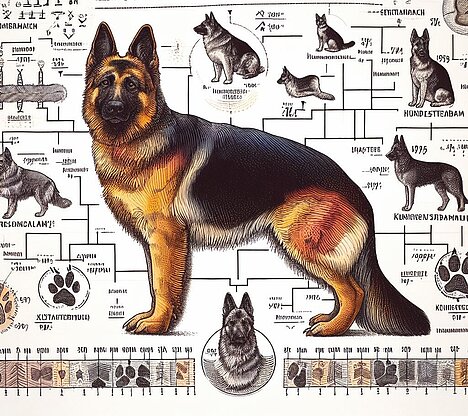Hereditary diseases

Hereditary diseases are diseases that are inherited through the genes of the parent animals. They can affect various organs and body parts and lead to pain, disability or even death.
In this article, you will learn more about some of the most common hereditary diseases in dogs, how to recognize and prevent them, and what you can do if your dog is affected.
Hip joint dysplasia
Hip dysplasia (HD) is a malformation of the hip joint that leads to osteoarthritis and lameness. HD mainly affects large and heavy dog breeds such as German Shepherds, Bernese Mountain Dogs and Golden Retrievers. The cause is a combination of genetic and environmental factors such as overfeeding, growing too fast or too much exercise.
The symptoms of HD can appear as early as puppyhood or only become apparent in old age. Typical signs include difficulty standing up, limping, sensitivity to pain or limited mobility. To diagnose HD, a vet must take an x-ray of the hip joint.
The treatment of HD depends on the severity of the disease. In mild cases, weight reduction, an adapted diet and moderate exercise therapy can help to alleviate the symptoms. In severe cases, surgery may be necessary to stabilize or replace the joint.
To prevent HD, you should make sure that your dog does not become overweight, that it is fed a high-quality diet and that it does not get too much or too little exercise. You should also only buy dogs from reputable breeders who have their breeding stock tested for HD.
Progressive retinal atrophy
Progressive retinal atrophy (PRA) is a degenerative disease of the retina that leads to blindness. PRA affects many dog breeds such as poodles, Labrador retrievers and dachshunds. The cause is a genetic defect that impairs the function of the photoreceptors in the retina.
The symptoms of PRA can vary depending on breed and age. Typical signs include night blindness, reduced visual acuity or a gray haze over the eyes. To diagnose PRA, a vet must carry out an eye examination.
Unfortunately, there is no treatment for PRA. There is no medication or surgery that can halt the progression of the disease. However, with a little help, blind dogs can lead a happy life. You should make sure that your dog feels safe in his environment, that he does not bump into sharp or dangerous objects and that he always hears your voice.
To prevent PRA, you should only buy dogs from reputable breeders who test their breeding stock for PRA.
Von Willebrand's disease
Von Willebrand's disease (vWD) is a blood clotting disorder that leads to severe bleeding. vWD affects many dog breeds such as Doberman Pinschers, Rottweilers and Scottish Terriers. The cause is a lack of a protein called von Willebrand factor, which is important for blood clotting.
The symptoms of vWD can vary depending on the severity of the disease. Typical signs include nosebleeds, bleeding gums, bloody urine or stool, or excessive bleeding after injury or surgery. To diagnose vWD, a veterinarian must perform a blood test.
The treatment of vWD depends on the severity of the condition. In mild cases, a blood transfusion or the administration of medication that promotes blood clotting may help to stop the bleeding. In severe cases, surgery may be necessary to close the bleeding vessels.
To prevent vWD, you should only buy dogs from reputable breeders who have their breeding animals tested for vWD.
The authors assume that a veterinarian should be consulted if an animal is ill and that medication should only be taken after consultation with a doctor or pharmacist. Only an individual examination can lead to a diagnosis and treatment decision.
We help you find the nearest vet → This way